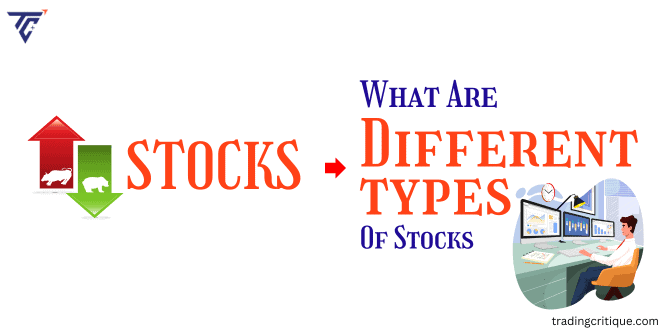
Identify Forex Scams in Simple Steps – Trading Critique
A forex trading scam is a scheme that tries to trick you by giving you money in the forex market. Scammers promise you to give high returns or guarantee profits. But this is unrealistic.
Back To Top
What are stocks? Stocks are like pieces of a company that you can own. If you have stock, you own a part of the company, and you might get some of the money the company makes and the right to vote on certain decisions.
Not all stocks are the same, and you can buy or sell them on stock exchanges or privately. The government keeps an eye on these transactions to prevent cheating. Your stocks can be stored online.

When a company creates more stocks, the existing owners own a smaller part. Companies can also buy back their stocks. Stock options for employees don’t mean they own part of the company but give them the chance to buy stock later at a set price.
The stock market is a marketplace where individuals engage in the buying and selling of company shares. This happens through exchanges and over-the-counter markets, following certain rules. “Stock market” and “stock exchange” are terms often used together.
Trader’s trade shares on exchanges and major ones in the U.S. are the New York Stock Exchange (NYSE) and NASDAQ.
Stock market investments can be broadly categorized into various types, each with its characteristics, risk levels, and potential returns influenced by market capitalization.
Here are some of the main types of stock market investments:

Stocks are a type of investment known as equity investment. Investing in stocks involves purchasing a share or ownership stake in a company. The goal is to benefit from the potential increase in the value of those shares over time and, in some cases, to receive a share of the company’s profits in the form of dividends.
Investment Insights
To further enhance your trading success, consider exploring opportunities with trusted Forex brokers . Staying informed and utilizing authentic broker reviews can be crucial in making intelligent trading decisions. Whether you’re interested in stocks or other investment vehicles like CFDs, forex, and cryptocurrencies, the right broker can provide the guidance and tools necessary for a more informed and potentially profitable trading experience.
Common stock and preferred stock are the two main types of ownership shares that investors can have in a company.
What are the different types of stocks? There are several types of stocks, and they can be classified based on various criteria. Here are some common types of stocks:
Environmental, Social, and Governance (ESG) stocks align with responsible corporate behavior. These stocks are rated by third-party systems based on their environmentally sustainable, socially responsible, and well-governed business practices.
ESG stocks investing allow investors to support companies with values that align with their own.
Cyclical stocks are directly affected by the overall health of the economy, typically mirroring the economic cycle of growth, peak, downturn, and recovery. They tend to be more unpredictable and perform better when the economy is strong, and consumers have more money to spend.
On the other hand, non-cyclical stocks operate in industries that are less affected by economic changes, often referred to as “recession-proof.” These stocks usually do well when the economy is not doing great because people still need and use their products and services.
Defensive stocks give steady returns in different economic situations. These companies often offer essential things like everyday products, healthcare, or utilities. Putting money in defensive stocks can help safeguard your investment from big losses when the market goes down.
Some companies issue multiple classes of stock, such as class A and class B. This is done to give key investors more control over the company.
For instance, class A stock may have more voting power than class B stock, providing insiders with greater influence over the company’s decisions. Alphabet Inc., the parent company of Google, is an example of a company with multiple classes of stock, including class A (GOOGL) and class B shares.
Large-cap stocks are shares issued by companies with a market capitalization of $10 billion or more. These companies are considered stable and less risky, as they can better withstand market disruptions. However, they may grow at a slower rate compared to smaller companies, leading to more modest returns for investors.
Mid-cap stocks are valued in the market ranging from $2 billion to $10 billion. They merge the steadiness of well-established firms with the expansion possibilities of smaller enterprises. Mid-cap stocks may offer growth opportunities, and they are often targeted for mergers or acquisitions by larger companies.
Small-cap stocks represent shares of companies with a market value ranging from $300 million to $2 billion. While they offer potential for significant growth, they are also riskier and more volatile. Small-cap stocks can include companies facing financial difficulties or those ripe for acquisition.

Growth stocks are companies experiencing rapid growth in revenues, profits, share prices, or cash flows. Investing in growth stocks aims for strong price appreciation over time. However, they come with higher volatility as these companies often take risks to achieve growth.
Value stocks are shares of companies considered undervalued by the stock market. Value investors seek out these companies, anticipating that their true value will be recognized over time. They look for low price-to-book ratios and other indicators of undervaluation.
International stocks come from companies outside one’s home country, providing additional diversification. Investing in international stocks exposes investors to different market forces, faster-growing economies, and varying risk and return patterns. However, currency fluctuations and geopolitical risks need consideration.
Dividend stocks pay regular dividends, offering investors a steady income in addition to potential price appreciation. Dividend reinvestment programs (DRIPs) allow investors to automatically reinvest their dividends for potential long-term gains.
Initial Public Offering (IPO) stocks involve private companies going public by listing shares on stock exchanges. While IPO stocks can be exciting, they are also risky, and not all newly listed companies succeed. Investors should exercise caution and limit exposure to IPO stocks.
Blue chip stocks are large-cap companies with a history of reliable performance, steady earnings, and consistent dividend payments. While they provide steady returns and dividends, they may have higher per-share costs and slower growth.
Income stocks offer regular income through higher-than-average dividends, often distributed from a company’s profits. Income stocks, like utilities, are less likely to experience big price swings and may not grow in value as much. They’re a good choice for investors looking for a steady income.
Penny stocks are high-risk, speculative investments with low valuations, often associated with financial troubles or fraud. Penny stocks are not listed on major exchanges, making them illiquid and susceptible to manipulation.
Stocks represent ownership in companies and are popular investment vehicles. Investors can choose from various types, each with its own risk and return profile. Common and preferred stocks, penny stocks, international stocks, blue-chip, IPO stocks, growth stocks, ESG stocks, value, and income stocks cater to different investment goals.
Diversification and thorough research are key to navigating the dynamic stock market successfully. While stocks offer the potential for high returns, it’s essential to balance the risks associated with market volatility. Before getting into the stocks, learn how to find right stock investment.
There are two ways your shares can generate income. Firstly, through capital gains, which are the profits resulting from an increase in the stock’s value. Ideally, your stock will appreciate while you own it, allowing you to sell it for a higher price than what you paid. Moreover, certain companies pay out dividends.
Investing in stocks is a smart decision for long-term investors. Despite short-term fluctuations, the stock market consistently increases in value over the long run. There’s no better time to start investing than now.
Well, they can change a lot in value since they rely on how well a company does. This makes them riskier than bonds. When you buy stocks, it’s tricky to predict how much money you’ll make. But remember, more risk can mean more potential for profit.


A forex trading scam is a scheme that tries to trick you by giving you money in the forex market. Scammers promise you to give high returns or guarantee profits. But this is unrealistic.

An index fund is a collection of investments that follows the performance of a group of companies or a market index. For example, the S&P 500. It is like a large basket of investments that mirrors the performance of these selected companies. Instead of choosing individual stocks, the fund follows preset rules set by companies like S&P Dow Jones Indices.

Forex trading (foreign exchange trading) is the act of buying and selling currencies globally. In this guide, we will explain forex scams, how to spot a forex scam, and tips to avoid them.

Small enterprises can attract seasoned and skilled candidates by providing straightforward, dependable, and adaptable retirement schemes. Certain types of plans can even provide tax benefits. Here, we will explore the different types of retirement plans available to small businesses and how to establish them.

Foreign exchange trading involves exchanging one currency for another. By profiting from fluctuations in exchange rates between currencies, forex traders aim to generate returns on their investments. It operates 24 hours a day as currencies are traded across time zones.

Systematic investment plans offer a systematic approach to investing that allows individuals to invest a fixed amount of money in their preferred investment instruments on a regular basis. SIPs have several benefits including steady investment, versatility, the possibility of dollar-cost averaging, and the opportunity to start with small amounts of money.
